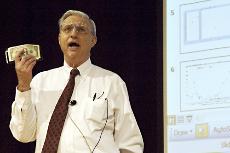Loyola University economics professor Walter Block keeps a detailed list of every interview and speech he gives to media and associations outside the university. In March 2008, he spoke at the Austrian Scholars Conference. In June 2008, he lectured for the Ludwig von Mises Institute and contributed to an economic video project. In October 2008, he spoke nine times for nine different organizations, including news network Al-Jazeera, the Carrollton Rotary Club and the economic thought school Liberty Fund.
Since mortgage giants Fannie Mae and Freddie Mac went under, some economics professors at Loyola have said they’ve seen a significant rise in their popularity.
“For once people are actually listening to what we say,” economics professor John Levendis said. “They still don’t believe us, but they’re listening.”
On the evening of Sept. 30 Loyola’s first “State of the Economy” forum, led by professors William Barnett and Ron Christner, boasted a turnout of about 300, according to Christner.
The third forum, hosted Oct. 23 by Barnett, had a considerably smaller turnout of 23, but still lasted over two hours as he discussed federal policies and their effects on the economy with the crowd.
“I suggested it,” Barnett said of the forums. “I said this might be something useful.”
Barnett, a senior professor of economics, has seen a lot of requests for television and radio interviews as well, and has become a regular on “The Think Tank” talk show on WWL-FM, according to his colleagues.
But even junior professors like Levendis are fielding requests. He attended the New Orleans Urban League of Young Professionals’ presidential debate watch party to help explain the economic questions.
“I’ve been asked, but I’ve turned down several,” Levendis said. “And I don’t even remember what those were. People call on the phone, and I don’t have time, but definitely all of us have been in high demand.”
Making teaching a priority is a common thread across the business school. Business professor George Karamessinis recently turned down a speaking request from Loyola because of his teaching load.
“It happens I have four classes,” he said. “I’m quite loaded this semester, so I really don’t have any time to do it.”
In addition to demand from the outside, student interest has spiked as well, according to Levendis.
“Before, I could teach a Principles of Macro(economics) class and tell you, ‘This is vitally important,'” he said. “Now people are starting to believe me.”
Barnett started teaching a new course called Current Topics in Macroeconomics this semester. Their textbook is The Wall Street Journal, and the timing couldn’t be better, Barnett said. They spend class time discussing the day’s news, and Barnett challenges his students to find what the articles left out and discuss different theories about what’s going on.
“It’s distressing in a way,” Kevin Marchiori, economics junior and a student in the class, said. “It opens your eyes to how much panic is actually going on.”
Barnett’s campus forums are like a synopsis of what they’ve been learning in class, according to Marchiori.
Barnett lamented in both his class and his forum that there is not enough time to cover all aspects of the current economic situation.
“We’ve got so much material to cover every day that we can’t even scratch the surface,” he said.
But many of his students appreciate that he explains everything he can.
“I’ve probably learned more in the last four or five weeks than in my entire life combined,” Marchiori said.
“If I didn’t take this class, I wouldn’t know anything that’s going on,” Jennifer Moreale, economics junior, said.
Now that people are realizing how important an understanding of economics is, the whole department has been energized, Levendis said.
“It’s also a bit depressing because it seems like the policies being implemented are exactly opposite of what we would’ve recommended,” he said.
So, what’s the most important thing economic experts can bring to the current situation?
“A level head,” Levendis said. “Don’t panic. There are ups, and there are downs. I don’t think we should be overreacting. I think most academic economists are of that opinion.”
Katie Urbaszewski can be reached at [email protected].








